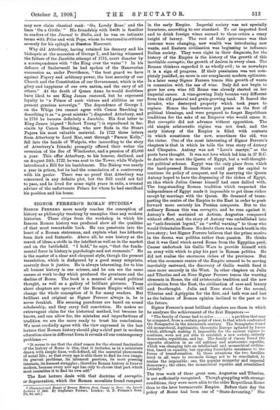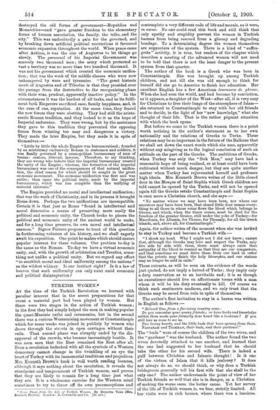SIGNOR FERRERO'S ROMAN STUDIES.*
SIGNOR FERRERO more nearly reaches the conception of history as philosophy teaching by examples than any modern historian. These chips from the workshop in which his famous Roman history was produced show all the qualities of that most remarkable book. He can penetrate into the heart of a Roman statesman, and explain what has hitherto been dark and fantastic. Above all, he sees history as the march of ideas, a strife in the intellect as well as in the market and on the battlefield. "I hold," he says, "that the funda- mental force in history is psychologic and not economic." He
is the master of a clear and eloquent style, though the present translation, which is disfigured by a good many misprints, scarcely does it justice. He is always interesting, for to him all human history is one science, and he can see the same causes at work to-day which produced the greatness and the decline of Rome. The book is a manual of sound political thought, as well as a gallery of brilliant pictures. These short chapters are aperpus of the Roman Empire which will change the whole conception of it for many readers. But brilliant and original as Signor Ferrero always is, he is never freakish. His seeming paradoxes are based on sound scholarship, and they carry full conviction. He makes no extravagant claim for the historical method, but because he knows, and can allow for, the mistakes and imperfections of tradition we are the more ready to trust his conclusions. We most cordially agree with the view expressed in the last lecture that Roman history should play a chief part in modern education since in different form it reveals all our contemporary problems :—
"It seems to me that the chief reason for the eternal fascination of the history of Rome is this, that it includes, as in a miniature drawn with simple lines, well-defined, all the essential phenomena of social life ; so that every age is able there to find its own image, its gravest problems, its , intensest passions, its most pressing interests, its keenest struggles ; therefore Roman history is forever modern, because every new age has only to choose that part which most resembles it to find its own self."
The first lecture deals with that doctrine of corruptio, or degeneration, which the Roman moralists found rampant
Characters and Events of Roman History from Caesar to Nero : the Lomat Lectures of 1908. By Gnghelmo Ferrero. London: G. P. Futnanis Sons. in. 6d. net.1
in the early Empire. Imperial society was not specially luxurious, according to our standard. To eat imported food and to drink foreign wines seemed to these critics a crazy height of luxury. The root of their grievance was that customs were changing, new wealth was introducing new wants, and Eastern civilisation was beginning to influence Italian society. They were right in their diagnosis, for the history of the Empire is the history of the growth of this inevitable corruptio, the growth of desires in every class. The Roman thinkers regarded it as wholly evil ; to us nowadays it is a sign of progress. If their pessimism was not com- pletely justified, no more is our complacent modern optimism.
In a later essay Signor Ferrero traces this growth of wants in connexion with the use of wine. Italy did not begin to grow her own wine till Rome was already started on her Imperial career. A vine-growing Italy became very different from the old pastoral and grain-growing land. It feared the invader, who destroyed property which took years to replace. Hence the landowners put peace as the first of political blessings, and were prepared to forget Republican traditions for the sake of an Emperor who would ensue it. But corruptio did not advance without opposition. The old simple aristocratic r6gime was not dead, and the early history of the Empire is filled with contests in which sometimes the new, sometimes the old, was the victor. One of the most interesting of Signor Ferrero's chapters is that in which he tells the true story of Antony and Cleopatra. Antony was not "Love's martyr," as the poets have thought. It was not love which led him in 37 B.C. to Antioch to meet the Queen of Egypt, but a well-thought- out political scheme. Egypt was the only place from which the hard-pressed Roman State could get the capital to continue its policy of conquest, and by marrying the Queen Antony hoped to have the dispensing of the riches of Egypt, an idea which Julius Caesar himself had once dallied with. The long-standing Roman tradition which respected the independence of Egypt made it impossible to get these riches except by marriage with the Queen. He dreamed of trans- porting the centre of the Empire to the East in order to push forward more securely his Persian conquests. But to the ordinary Roman this was corruptio, and he rose against it. Antony's fleet mutinied at Actium, Augustus conquered without effort, and the story of Antony was embellished into an "anti-feminist legend," an "awful warning" to those who would Orientalise Rome. No doubt there was much truth in the love-story; but Signor Ferrero believes that the prime motive in the drama was politics rather than passion. He thinks that it was Gaul which saved Rome from the Egyptian peril.
Caesar undertook his Gallic Wars to provide himself with an army with which to play his part in Roman politics. He did not realise the enormous riches of the provinces. But when the economic centre of the Empire seemed to be moving inevitably eastward, the discovery of Gallic wealth fixed it once more securely in the West. In other chapters on Julia and Tiberius and on Nero Signor Ferrero traces the warring elements in Rome, the old aristocratic tradition and the new civilisation from the East, the civilisation of ease and luxury and freethought. Julia and Nero stood for the second, Tiberius and Agrippina for the first, and both won and lost as the balance of Roman opinion inclined to the past or to the future.
Signor Ferrero's most brilliant chapters are those in which he analyses the achievement of the first Emperors :—
"The family of Caesar had to solve a problem that may be compared, from a certain point of view, to that which confronted the Bonapartes in the nineteenth century. The Bonapartes found old monarchical, legitimistic, theocratic Europe agitated by forces which, although making it impossible for the ancient regime to continue, were not yet able to establish a new society, entirely democratic, republican, and lay. The family of Caesar found the opposite situation in an old military and aristocratic republic, which was changing into an intellectual and monarchical civilisa- tion, based on equality, but opposing formidable resistance to the forces of transformation. In these situations the two families tried in all ways to reconcile things not to be conciliated, to realise the impossible: one, the popular monarchy and imperial democracy; the other, the monarchical republic and orientalised Latinity."
The true work of these great men, Augustus and Tiberius, is not sufficiently recognised. Though grappling with strange
conditions, they were more akin to the older Republican Rome than to the later bureaucratic Empire. Before their day the policy of Rome had been one of "State-devouring." She
destroyed the old forms of government—Republics and Monarchies—and "gave greater freedom to the elementary forms of human association, the family, the tribe, and the city." This was undoubtedly a gain for the governed, and by breaking down artificial political restrictions it favoured economic expansion throughout the world. When peace came after Actium, it was the aim of Augustus to let things go slowly. The personnel of his Imperial Government was scarcely two thousand men ; the army which protected so vast a territory was no more than two hundred thousand. It
was not his government which created the economic unifica- tion; that was the work of the middle classes who were now unhampered by wars and tyrannies. "The great historic
merit of Augustus and of Tiberius is that they presided over the passage from the destructive to the reorganising phase with their wise, prudent, apparently inactive policy." In the circumstances it was the hardest of all tasks, and to its fulfil- ment both Emperors sacrificed ease, family happiness, and, in the case of one, reputation. At the same time, they feared the new forces they were abetting. They had still the aristo- cratic Roman tradition, and they looked to it as the hope of Imperial endurance. They were wrong, but by the assistance they gave to this tradition they prevented the opposing forces from winning too easy and dangerous a victory. They made the later Empire, but they made it in spite of themselves :—
" Little by little the whole Empire was bureaucratised; founded by an aristocracy exclusively Roman in statesmen and soldiers, it was finally governed by a cosmopolitan bureaucracy of men of brains : orators, litterati, lawyers. Therefore, to my thinking, they are wrong who believe that the imperial bureaucracy created the unity of the Empire ; whereas, the formation of the imperial bureaucracy was one of the consequences of that natural unifica- tion, the chief reason for which should be sought in the great economic movement. The economic unification was first and was entire; then came the political unity, made by the imperial bureaucracy, which was less complete than the unifying of material interests."
The Empire provided no moral and intellectual unification; that was the work of Christianity, and in its process it brought Rome down. Perhaps the two unifications are incompatible. Certain it is that just as Rome "found in intellectual and moral dissension a means of preserving more easily the political and economic unity, the Church broke to pieces the political and economic unity of the ancient world to make, and for a long time preserve, its own moral and intellectual oneness." Signor Ferrero proposes to treat of this question in forthcoming volumes of his history, and we shall eagerly await his exposition. One point he makes which should ensure popular interest for these volumes. Our problem to-day is the same as the Roman. To-day we have a virtual economic unity, and, with the growth of arbitration and Treaties, some- thing not unlike a political unity. But we regard any effort "to establish moral and ideal uniformity among the nations"
as the wildest whimsy. Is our instinct right? Is it a law of heaven that such uniformity can only exist amid economic and political disintegration ?



























































 Previous page
Previous page